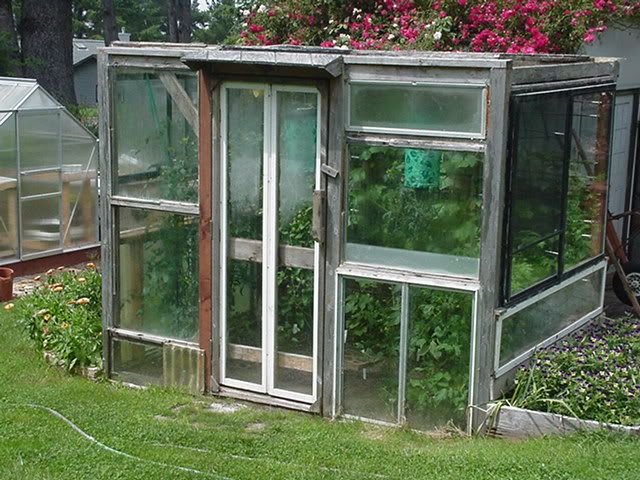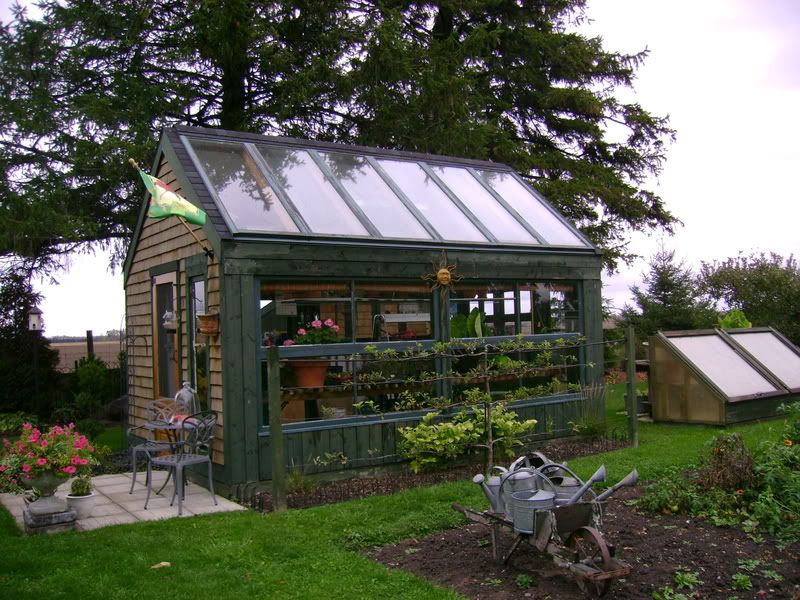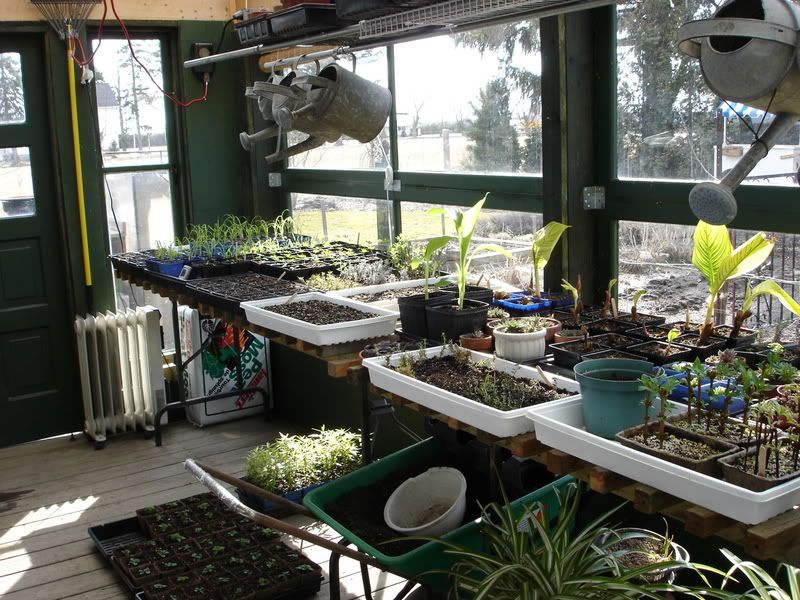Are we home gardeners getting away from the real meaning of organic? Should it mean just that our peas or the apples are grown organically and therefore is it ok to disregard the fact that they were grown in a plastic house, fed by water in plastic pipes, labelled with plastic labels and stored in plastic bags ?
Plastic is made from oil, mostly in places far away from where we live. We cannot legitimately say we are reducing food miles if the produce is raised in plastic houses. I even disagree with calling such food "organic" and free of artificial chemicals when so many chemicals have been used in its manufacture through the production of plastic.
I don't want to upset people who have just invested time and money in setting themselves up with a poly house and I understand that glass can be more expensive and certainly more time-consuming to construct, but there is a limit to how much plastic you can use and still call your food organic, I think.
Living in Tasmania now, I fully understand why a bit of extra help with getting things going and producing before the end of summer comes, is so necessary but, oh lalalala, isn't there another way? And I did not believe that the mad scheme of the South Australia government's to fill everyone's gardens with hundreds of metres of plastic drip irrigation was an intelligent way of dealing with a water shortage primarily caused by very poor government regulation on water licenses along the Murray River!
If we are truly seriously trying to live a greener life by growing our own, organic food we MUST stop investing in oil-based props to do so and, in fact, to do most things in our lives. Of course there are always compromises and I am as guilty as anyone else at not always taking the greenest option on things. Anyway, here are some of my ideas:

Find old windows before you start making your hothouse frame. Think outside the square and not follow some pre-conceived idea you have about what shape a glasshouse should be. I recommend collecting as many louvres as possible so you have ultimate control over the air flow and temperature... or putting hinges on old windows you find, or using sliding windows.
(Photos from Garden Web)
 Also on Garden Web is this fabulous one and all the details on how they did it:
Also on Garden Web is this fabulous one and all the details on how they did it:

I am hatching a plan..... making use of a little studio I have already..... thinking, thinking... always outside the square. (I have never understood that square and didn't even know there was one until a few years ago!)
Here is my little studio which, oddly, has south facing windows but a roof that slopes north.... so.... if I were to remove the overhanging buddleia and build a glass section on the northern side, I'd have THE most perfect glass house and potting shed all in one!
A Pickle update.....
Pickle is scanning the garden for rabbits. His feet are actually on the outside window ledge! Such simple pleasures.


9 comments:
We have a 3m long set of windows just begging to be built as part of a hothouse. When time permits and our strawbale house is finished, that will be our next project to be undertaken. We found it on eBay for the princely sum of $1.00 and even then seller refused to take payment for it. They were happy to be rid of it.
I agree, Kate. Organic is good, but it should be local and sustainable in other ways too. We've made all our cold frames from old windows.
Very thought provoking post! I wonder whether in some place using plastic would actually be less damaging to the environment than using wood (which would cause deforestation) or metal (which comes from industrial mines). Recycling seems the best bet though.
Exciting to hear about the plan for the empty-cardboard-box-shed -- er, I mean, studio :). Maybe Hugh and I can help you do that next year. (Or maybe you'll already have it done by then!)
Depends on the source of your wood. Be wary of tropical hardwoods, but softwood would be OK as that's grown in forestry plantations, and it takes CO2 out of the atmosphere.
There is so much recycled timber here, I did not even think to mention the wood!
Where will I move all those boxes to next, Alex??
You've given me something to think about. I've been wondering whether to replace the tattered old plastic covering the tunnel house that was here when we bought the place. Maybe I'll build one out of recycled windows instead. They look much nicer too.
We've recently been on a crusade to reduce plastic in our lives. It's surprising how much of it there is. Our biggest challenge is finding plastic bag alternatives for veggies, fruit and meat (we produce our own meat and sometimes have excess veggies). In most other areas we've pretty much eliminated it.
Thanks for an interesting post!
Tread lightly on the earth and make your own considered decisions on using resources.
Most of what we have ever used over the past 30 year has been second hand.Our tunnel house is a case in point. We bought it second hand out of the local paper 20 years ago, the plastic it came with lasted 7 years before being replaced with the current plastic. the shape is very useful and it has produced a vast amount of food and seedlings throughout the year and is necessary in this part of the Adelaide Hills.Hardly consumption based I would have thought!
Here's another little eg of reducing waste- we buy our milk from the local dairy in 2 litre flagons which are returned to be refilled.(some would go on about energy to wash etc)But we prefer our milk in glass and to support our local dairy.In fact we have bartered the repairs to their quad bike for a years supply of milk!
We then make our own yogurt in glass jars- yogurt containers are about the only containers we used to buy in and they where cut up and used to make plant lables but I developed a method of reusing them and it acts as a panting guide as well.See from 'from chaos to order in a few minutes' on my blog. Every now and then I need some new ones and since I refesh my yogurt started every 3 months I have a new container to cut up for plant tags.
I beleive that most home gardeners are not 'organic'for other reasons - like basic quality composting v buying 'organic' fertilisers or worse using animal manures directly on gardens or the idea we need 'organic' pest control.much of this food i would not eat! BUT thats another story.
Is it worth pointing out that glass takes a huge amount of fossil fuel to make? A lot more than a few (very thin) sheets of plastic do.
Your little glasshouse is so cute! I want to build one on my back patio to house my washer/dryer and link the back door to the door to the chicken coop. Thank you for such a lovely clear photo!!!
Post a Comment